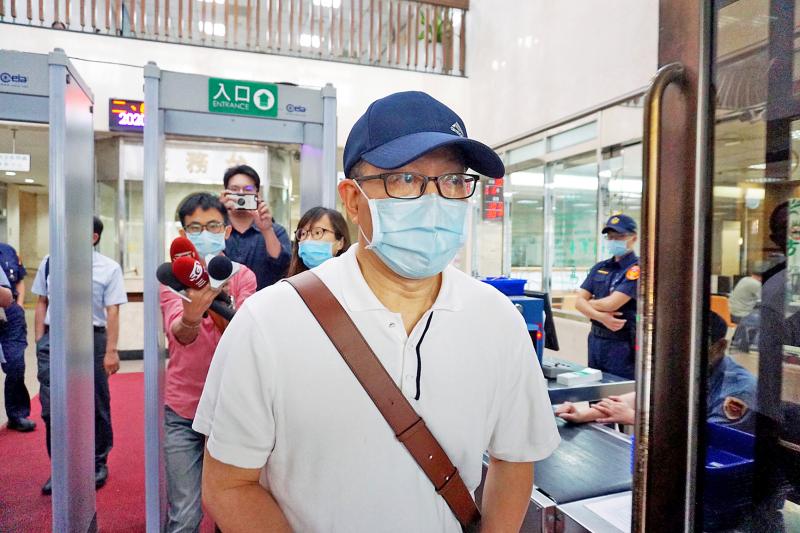Five Taiwanese businesspeople working in China were yesterday found guilty of taking money from Chinese authorities to buy votes for Chinese Nationalist Party (KMT) candidate Han Kuo-yu (韓國瑜) in the 2020 presidential election.
The Taipei District Court sentenced Association of Taiwan Investment Enterprises (台灣同胞投資企業協會) Changsha City Branch chairman Lin Huai (林懷) to three years and 10 months in jail, with deprivation of his civil rights for four years.
The other four convicted in the case, who all received 20-month prison terms, were China New Family Association (中華兩岸新家庭協會) chairwoman Chiang Ming-sia (蔣明霞), Hunan Shaoyang City Association in Taiwan (湖南邵陽旅台同鄉會) director Chang Kuo-chun (張國君), Hengyang-based businessman Chuang Huan-chang (莊桓漳) and Chinese Women’s Federation (中華婦女聯合會) deputy secretary Shen Bin (沈斌), who had conducted business in Hunan.

Photo: CNA
A Taipei District Prosecutors’ Office investigation found that money to fund the vote-buying scheme came from Huang Daonian (黃道年), director of the Economic Bureau at Changsha’s Taiwan Affairs Office (TAO).
With funding from Huang, Lin and the other defendants organized gatherings and banquets to convince Taiwanese in Hunan to support the KMT and Han’s presidential campaign in late 2019, including offering to pay their airfares, the investigation found.
The Changsha City Government and the local TAO allocated 3.5 million yuan (US$551,268 at the current exchange rate) to support subsidies for Taiwanese to return home to vote, with Lin applying for and receiving about 1.49 million yuan, the investigation found.
Huang allegedly told his staff to assist Lin and other Taiwanese businesspeople in applying for funds and obtaining registered lists of Taiwanese living in Hunan, prosecutors said.
In their largest election event, the defendants on Dec. 21, 2019, organized a year-end banquet for Taiwanese at Changsha’s Huatian Hotel, where they instructed attendees to buy tickets to fly home to vote for Han and other KMT candidates on Jan. 11, 2020, and showed them how to obtain 1,500 yuan to pay for the cost of the airfares, the investigation showed.
Documents showed that 467 Taiwanese who attended the event applied for the money, prosecutors said.
Lin and the defendants gave “bribes” in exchange for votes for specific candidates and breached the Presidential and Vice Presidential Election and Recall Act (總統副總統選舉罷免法), the ruling said.
Association of Taiwan Investment Enterprises in Changsha City deputy chairman Tung Chien-hua (佟建華) and Taipei-based Chinese Women’s Federation chairwoman Ho Jianghua (何建華) were indicted with the others in May last year, but were found not guilty due to insufficient evidence.
After learning of the sentences, Han’s office yesterday said that he was unaware of the events and that his election campaign headquarters did not receive any funds from those involved.
Additional reporting by Jason Pan and CNA

CHAOS: Iranians took to the streets playing celebratory music after reports of Khamenei’s death on Saturday, while mourners also gathered in Tehran yesterday Iranian Supreme Leader Ayatollah Ali Khamenei was killed in a major attack on Iran launched by Israel and the US, throwing the future of the Islamic republic into doubt and raising the risk of regional instability. Iranian state television and the state-run IRNA news agency announced the 86-year-old’s death early yesterday. US President Donald Trump said it gave Iranians their “greatest chance” to “take back” their country. The announcements came after a joint US and Israeli aerial bombardment that targeted Iranian military and governmental sites. Trump said the “heavy and pinpoint bombing” would continue through the week or as long

TRUST: The KMT said it respected the US’ timing and considerations, and hoped it would continue to honor its commitments to helping Taiwan bolster its defenses and deterrence US President Donald Trump is delaying a multibillion-dollar arms sale to Taiwan to ensure his visit to Beijing is successful, a New York Times report said. The weapons sales package has stalled in the US Department of State, the report said, citing US officials it did not identify. The White House has told agencies not to push forward ahead of Trump’s meeting with Chinese President Xi Jinping (習近平), it said. The two last month held a phone call to discuss trade and geopolitical flashpoints ahead of the summit. Xi raised the Taiwan issue and urged the US to handle arms sales to

BIG SPENDERS: Foreign investors bought the most Taiwan equities since 2005, signaling confidence that an AI boom would continue to benefit chipmakers Taiwan Semiconductor Manufacturing Co’s (TSMC, 台積電) market capitalization swelled to US$2 trillion for the first time following a 4.25 percent rally in its American depositary receipts (ADR) overnight, putting the world’s biggest contract chipmaker sixth on the list of the world’s biggest companies by market capitalization, just behind Amazon.com Inc. The site CompaniesMarketcap.com ranked TSMC ahead of Saudi Aramco and Meta Platforms Inc. The Taiwanese company’s ADRs on Tuesday surged to US$385.75 on the New York Stock Exchange, as strong demand for artificial intelligence (AI) applications led to chip supply constraints and boost revenue growth to record-breaking levels. Each TSMC ADR represents

State-run CPC Corp, Taiwan (CPC, 台灣中油) yesterday said that it had confirmed on Saturday night with its liquefied natural gas (LNG) and crude oil suppliers that shipments are proceeding as scheduled and that domestic supplies remain unaffected. The CPC yesterday announced the gasoline and diesel prices will rise by NT$0.2 and NT$0.4 per liter, respectively, starting Monday, citing Middle East tensions and blizzards in the eastern United States. CPC also iterated it has been reducing the proportion of crude oil imports from the Middle East and diversifying its supply sources in the past few years in response to geopolitical risks, expanding